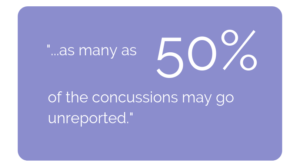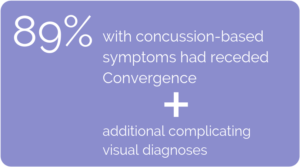Peer Reviewed Articles About Concussion Recovery Using Vision Therapy

As parents, nosotros want our children to appoint in activities that volition help them grow and develop confidence. The importance of extracurricular activities, such as sports is key in personal development and achievement. However, equally in anything worth doing there can exist risks involved. For the educatee-athletes engaged in physical sports ranging from soccer, football, hockey, and even competitive cheerleading, in that location is the chance of sustaining a concussion.
The American Medical Guild for Sports Medicine position statement: concussion in sports states, "It is estimated that as many as 3.8 meg concussions occur in the USA per year during competitive sports and recreational activities; however, every bit many as 50% of the concussions may get unreported." Further, it states, "While the majority of concussions resolve within 7–10 days, in some cases symptoms persist for weeks, months or years beyond the initial injury."

Those who endure from chronic concussion-based symptoms, at the root of these symptoms are typically visual problems that, when left untreated, are tough to manage. From the words of one of our patients, "My journey started about v years agone when I had a pretty significant hit to my head. Presently later on that, I began to notice some negative changes in my vision. My eyes would become fatigued after the simplest of visual tasks. They felt like they were being pulled apart when reading anything upwardly shut, I had blurry vision, double vision, light sensitivity, and headaches. It got to the betoken where I would completely avoid using a figurer, Tv, etc. Fifty-fifty driving fabricated my eyes symptomatic. It was a tough fourth dimension for me to say the least."
Indeed, persistent visual problems and related frustration are oftentimes in these patients with chronic concussion-based symptoms. Therefore, the first step should begin with a referral to a vision care provider for a comprehensive eye health and vision evaluation. All the same, while this might seem like the solution to the problem; if the dr. limits the evaluation to eye health and refraction for glasses alone, critical categories of visual function related to eye coordination involving binocular vision/vergence (heart teaming), accommodation (heart focusing) and oculomotor function (eye tracking) may exist overlooked.
Ane crucial example of eye coordination involving binocular vision involves testing of the ii optics performing "convergence." If the doctor does a procedure called the Near Point of Convergence Test, they will oftentimes find the patient with postal service-concussion symptoms to exhibit difficulty with convergence to an average ability (<7cm). As a result, they may diagnose the patient with Convergence Insufficiency.
Notwithstanding, as in annihilation circuitous, such as the visual complications associated with a concussion, the notion that performing a unmarried test yields the complete diagnosis and single treatment are worthy of caution. To this indicate, new research past Harvard Medical School makes a clear case for a more than comprehensive vision evaluation for those with chronic concussion-based symptoms. In their article, Post-Concussion: Receded Near Bespeak of Convergence is Not Diagnostic of Convergence Insufficiency; the researchers conclude that not simply postal service-concussion patients have a reduced nearly-point of convergence just, these patients take additional complicating visual diagnoses that we must address.

Their inquiry found, of those with chronic concussion-based symptoms, 89% had a receded Near Point of Convergence. Nevertheless, in improver, these same patients with a receded NPC had an array of oculomotor (eye tracking), accommodative (middle focusing) and binocular/vergence (eye teaming) dysfunction. Put another way; their reduced NPC was just the "tip of the iceberg".
Specifically, of the 89% of those patients with a receded NPC:
- 95% had an oculomotor disorder
- 84% had deficits in adaptation (solely 41% or in combination with vergence disorders 43%)
- 54% had vergence disorders (also usually accompanied by an accommodative disorder 78%)
Whereas, convergence insufficiency "standing lonely," was constitute in simply six% of the cases
Therefore, their conclusion reads: "Because handling options for the diverse oculomotor dysfunctions differ, it is prudent that these patients (with concussion-based symptoms) undergo a thorough examination of their vergence and accommodative systems and then that an accurate diagnosis tin be made and appropriate handling prescribed."
Appropriate treatment, as outlined past the American Optometric Association in the Clinical Do Guideline (CPG-18) for Accommodative and Vergence Dysfunction, is role-based optometric vision therapy/rehabilitation.
For parents looking for answers when their child or educatee-athlete is experiencing chronic concussion-based symptoms; appropriate and effective treatment for these complex sensorimotor problems requires a comprehensive office-based vision rehabilitation model. This arroyo includes the integration of binocular/vergence function with adaptation and oculomotor function past a skilled vision therapist applying appropriate lenses, prisms and therapeutic tints prescribed and supervised by an experienced Doctor of Optometry who specializes in developmental vision and rehabilitation.
At Wow Vision Therapy, this is the focus of our entire team of Board Certified Doctors and Vision Therapists who provide the very best care available to remediate the circuitous visual problems associated with chronic concussion-based symptoms and then our patients can apace return to learn, return to work, render to play… and, Return to YOU!
 Dan L. Fortenbacher, O.D., FCOVD
Dan L. Fortenbacher, O.D., FCOVD
Founder
Wow Vision Therapy
Go far Bear upon
Concerned y'all or your kid may exist struggling with a concussion-based vision problem and wish to learn more than virtually vision therapy? Please fill out the grade below and one of our Patient Care Coordinators will be in touch to answer your questions or help schedule an evaluation for you.
Source: https://wowvision.net/harvard-research-shares-new-info-on-concussions-vision/